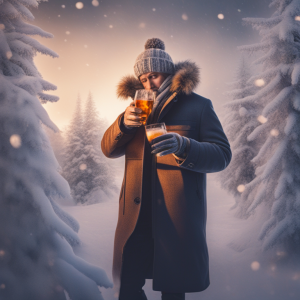Understand the Dangers of Alcohol Consumption in Freezing Temperatures
As we confront the harsh challenges of winter, particularly in extremely cold climates, our natural impulse for warmth often drives us to seek solace in a drink. However, it is crucial to recognize the significant risks that accompany this choice. This article will illuminate the perils of consuming alcohol in icy environments, highlighting why this habit is not only dangerous but also ineffective in maintaining body heat. By increasing your awareness of these risks, you can make informed decisions that prioritize your safety and well-being during the treacherous conditions of winter.
Before exploring the associated dangers, it is important to dispel the widespread myth that alcohol can act as a warming agent. When alcohol is consumed, it causes dilation of blood vessels near the surface of the skin, leading to a misleading sensation of warmth. Although this feeling may seem comforting, it does not address the essential need to maintain a stable internal body temperature. In reality, the effects of alcohol can be detrimental, potentially diminishing your ability to withstand cold weather and significantly raising the risk of life-threatening conditions like hypothermia and other serious health issues.
 One of the most significant dangers associated with drinking alcohol in cold weather is the heightened risk of dehydration. Alcohol is a known diuretic, which increases urine production and results in substantial fluid loss. Additionally, the cold air typical of winter is drier, causing our bodies to lose moisture more quickly in these conditions. When these elements combine, the outcome can be dangerously low hydration levels, which are vital for sustaining overall health and survival. Dehydration can adversely affect physical performance and cognitive abilities, complicating clear thinking and rational decision-making in critical situations.
One of the most significant dangers associated with drinking alcohol in cold weather is the heightened risk of dehydration. Alcohol is a known diuretic, which increases urine production and results in substantial fluid loss. Additionally, the cold air typical of winter is drier, causing our bodies to lose moisture more quickly in these conditions. When these elements combine, the outcome can be dangerously low hydration levels, which are vital for sustaining overall health and survival. Dehydration can adversely affect physical performance and cognitive abilities, complicating clear thinking and rational decision-making in critical situations.
Recognizing How Alcohol Affects Judgment and Awareness in Cold Conditions
Another serious consequence of alcohol consumption is its ability to impair cognitive function and decision-making skills. In survival scenarios, the ability to make clear, rational decisions is essential for ensuring personal safety. Alcohol can cloud judgment, making it increasingly difficult to respond effectively to potential hazards. This compromised reasoning capacity can lead to accidents and poor choices, which may have catastrophic results in extreme cold. Maintaining awareness of one’s surroundings is vital; however, alcohol undermines this necessity, increasing the likelihood of errors that could jeopardize personal safety.
Furthermore, alcohol can disrupt the body’s natural mechanisms for regulating temperature. Upon consumption, alcohol causes blood vessels in the skin to expand, which leads to increased heat loss. While this may create a temporary sensation of warmth, it ultimately accelerates the loss of core body heat, which is essential for survival. This sets off a dangerous cycle: the fleeting warmth gives way to a rapid decline in core temperature, heightening the risk of life-threatening conditions such as hypothermia. It is crucial to understand that while alcohol may seem to provide a quick fix for cold, it ultimately increases one’s vulnerability.
Understanding the Critical Link Between Alcohol Use and Hypothermia Risk
When examining the risk of hypothermia, one must grasp how alcohol consumption can obscure the early warning signs of this dangerous condition. Hypothermia occurs when the body’s core temperature falls below the normal threshold, typically below 95 degrees Fahrenheit (35 degrees Celsius). Symptoms may include shivering, confusion, fatigue, and reduced coordination. However, alcohol suppresses the body’s natural responses, making it increasingly difficult to recognize these critical indicators. By the time hypothermia symptoms become apparent, it may already be too late to avert severe injury or even life-threatening outcomes.
In winter survival situations, there are many safer and more effective alternatives to alcohol for maintaining warmth. Here are several strategies that can significantly boost your ability to stay warm and safe:
1. Dress in Layers for Optimal Warmth: Wearing multiple layers of clothing is essential for trapping warm air effectively. Begin with thermal base layers, add insulating mid-layers, and finish with a windproof and waterproof outer layer to create a protective barrier against the cold.
2. Ensure Your Clothing and Footwear Remain Dry: Moisture can lead to rapid heat loss, making it vital to keep your clothing and footwear dry at all times. Opt for waterproof materials and change into dry garments whenever necessary to help maintain warmth.
3. Insulate Yourself from the Cold Ground: Utilizing sleeping mats or insulation pads can significantly minimize heat loss, especially during sleep. This step is critical for conserving body heat during extended periods in cold environments.
4. Choose Warm, Non-Alcoholic Beverages: Instead of turning to alcohol, explore hot beverages like tea, coffee, or hot chocolate. These drinks provide warmth without the adverse effects associated with alcohol consumption.
5. Seek or Construct Shelter for Protection: Actively finding or building a shelter can greatly reduce exposure to harsh winds and freezing temperatures. A well-constructed shelter is crucial for retaining body heat, significantly improving your chances of staying warm.
6. Fuel Your Body with Energy-Dense Foods: Consuming nutrient-rich, high-calorie foods can deliver the energy your body needs to generate heat. Foods such as nuts and fatty fish are excellent sources of healthy fats that can provide considerable advantages.
Understanding the risks associated with alcohol consumption in freezing temperatures is essential for anyone involved in winter survival scenarios. Despite the temporary sensation of warmth, alcohol can lead to dehydration, impaired decision-making, disrupted temperature regulation, and mask the symptoms of hypothermia. By avoiding alcohol and adopting safe, effective strategies, we can enhance our chances of surviving and thriving in harsh winter conditions. Stay alert, prepare thoroughly, and prioritize your safety above all else.
The post Hazards of Alcohol Consumption in Extreme Cold Conditions appeared first on Survival Bite.
The Article Alcohol Consumption Hazards in Extreme Cold Conditions Was Found On https://limitsofstrategy.com


This article raises some important points that resonate with my own experiences. I’ve always enjoyed the coziness of winter gatherings, often with a warm drink in hand, but I’ve been increasingly wary of how alcohol fits into that picture. The myth of alcohol as a warming agent is something I’ve come across frequently, and it’s surprising how ingrained it is in our culture.
This topic really strikes a chord with me! I remember a winter camping trip where I thought a warm drink would help against the chill, but I quickly learned how misleading that warmth can feel. Your point about the blood vessel dilation is so important—many people don’t realize that this false sense of warmth can put them at greater risk for hypothermia.
It’s interesting how our experiences in the outdoors can teach us some hard lessons. I can relate to your winter camping trip—I’ve had moments where the allure of that warm drink made me feel invincible against the cold, only to realize that the body’s response can indeed be a bit deceptive. The dilation of blood vessels might give that initial comfort, but it’s a real wake-up call to understand the science behind it.
It’s interesting to see how easily misconceptions about alcohol can take hold, especially when it comes to our desire for comfort in winter. I’ve definitely fallen for the “warming” allure myself while sitting by the fire, but now I find myself reconsidering those choices in light of the real risks.
I appreciate your reflections on the subject. It’s fascinating how our perceptions can be shaped by seasonal experiences, and winter definitely brings out that desire for warmth and comfort. It’s easy to reach for a drink on a cold night, believing it provides that cozy feeling. What’s really happening, though, can be counterintuitive.
Ah, the classic winter dilemma: huddling by the fireplace with a hot drink or braving the icy outdoors with a bottle of your favorite “warming” libation. I can totally relate to the lure of that cozy cocktail after a long day of shoveling snow. But your post shines a light on an essential truth that I think many folks overlook—it’s like thinking you’re getting a cuddly hug from that fluffy dog when he’s actually just hiding a few too many cases of puppy breath!
Your comment captures that winter struggle perfectly. There’s something almost ritualistic about making that choice between cozying up inside with a warm drink or braving the cold for a little adventure outside. After a long day wrestling with snow, who wouldn’t crave that cozy cocktail? It’s comforting, it makes the chill seem less biting, and sometimes it even feels like a little reward for pushing through the day.
You really nailed that winter dilemma—it’s such a balancing act, isn’t it? There’s something undeniably comforting about curling up with a hot drink, especially when the wind outside feels like it’s trying to cut right through your layers. But then, there’s also that exhilarating feeling of stepping into the cold with a warming libation in hand, as if you’re proving to the elements that you won’t back down.
You’ve painted a pretty relatable picture there. The tug-of-war between a cozy evening indoors and the call of winter’s beauty can be quite the balancing act. It makes me think about how we often seek comfort as a kind of temporary escape, whether that’s cuddling up with a hot drink or stepping into the crisp air with a spirit that promises warmth and relaxation.
This article touches on a topic that I think is often overlooked, especially during the winter months when many people crave cozy comforts. The notion that alcohol can serve as a warming agent is indeed a pervasive myth, and your explanation of how alcohol affects blood vessel dilation really helps clarify why this misconception can be dangerous.
You’ve raised an important point about the misconceptions surrounding alcohol consumption in cold weather. I’ve often encountered this idea in my social circles—people think that a hot toddy or a whisky will keep them warm during winter outings. However, the science behind it is quite concerning. The false sense of warmth that comes from alcohol can lead to reckless decisions, like staying outside longer than we should or not dressing appropriately for the cold.